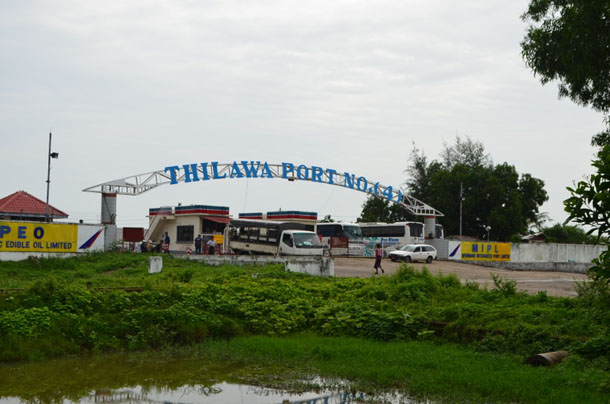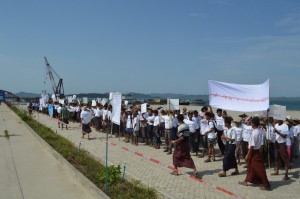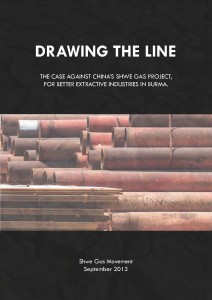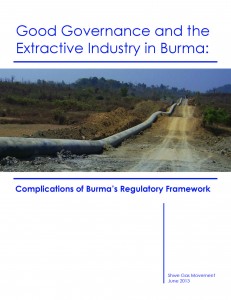Posts Tagged ‘Environment’ (39 found)
Will Japan Become a Model of Irresponsible Development in Burma?
 As the Thilawa Special Economic Zone Project (Thilawa SEZ) forges ahead, anger over the treatment of the local communities who are being displaced is growing. The Japan International Cooperation Agency (JICA), who just signed a deal that formalizes the financing of Thilawa SEZ is treating the communities currently living on the site area with undisguised disdain, drawing ire from local and international organizations, including on their home turf.
As the Thilawa Special Economic Zone Project (Thilawa SEZ) forges ahead, anger over the treatment of the local communities who are being displaced is growing. The Japan International Cooperation Agency (JICA), who just signed a deal that formalizes the financing of Thilawa SEZ is treating the communities currently living on the site area with undisguised disdain, drawing ire from local and international organizations, including on their home turf.
Covering around 2,400 hectares of land, the Thilawa SEZ is located 20km outside Rangoon and will include factories, a deep sea port, housing developments and other infrastructure for transport and communications. The project is a joint effort between Japan and Burma, with the Burma government and domestic businesses holding a 51% stake and the Japan government and Japanese businesses owning a 49% stake with funding being channelled through JICA as part of Japan’s overseas development assistance. Yet in order for these components to go ahead thousands of local people will be displaced. Phase One of the project, which has already started, has seen the relocation of 300 villagers yet the relocation site consists of inadequate housing, no alternative farmland, a lack of a clean water supply and very few livelihood opportunities, leaving people in debt just a few months after moving […]
• • •Burma’s Government must Suspend All Dam Plans on the Salween River
The Karenni Civil Society Network (KCSN) urges the Burmese government and companies from neighbouring countries to immediately suspend their plans to build hydropower dams on the Salween and other rivers in Burma. KCSN has learned that there are at least two large dams planned on the Salween in Karenni State […]
• • •Press Statement on Interational Day of Action for Rivers and Against Dams
(33538) ethnic signatories and (131) civil society and political parties in Burma call for immediate halt to dams on the Salween River
(33538) people from Shan, Karenni, Karen and Mon State and (131) civil society and political parties in Burma have signed a petitionurging an immediate halt to the six dams planned by the Burmese government on the Salween River, including the Kun Long/UpperThanlwin, Nong Pa, Man Taung and Tasang dams in Shan State,Ywathit dam in Karenni State and Hatgyi dam in Karen State […]
• • •Corporate Human Rights Abuses in ASEAN: Civil Society Calls for Corporate Accountability and Compliance with International Human Rights Law
Civil society groups called for greater corporate accountability in the region, which requires a regulatory framework based on international human rights norms and standards, to address the escalation of corporate human rights abuses in ASEAN, during the launch of a report, titled “Corporate Accountability in ASEAN: A Human Rights-Based Approach”, in Jakarta yesterday […]
• • •A Dangerous Precedent for Development in Burma
 On 30 September, Shwe Gas Movement released a new report entitled, “Drawing The Line: The Case Against China’s Shwe Gas Project, For better Extractive Industries in Burma”. The report highlights the consequences, violations, unequal development, inadequate laws and the dangerous precedent set by the Shwe Gas Project. With increased investment and the liberalization of Burma’s economy, development projects similar to Shwe Gas are set to increase. If they follow a path of code and conduct similar to the Shwe Gas Project, the future of Burma will be rife with increased land confiscation, labor abuse, environmental degradation, loss of livelihoods, conflict, arrests and imprisonment of rights activists defending themselves and their communities. The benefits will be unequally distributed and negative consequences will be borne by farmers, fishermen, and by the citizens of Burma.
On 30 September, Shwe Gas Movement released a new report entitled, “Drawing The Line: The Case Against China’s Shwe Gas Project, For better Extractive Industries in Burma”. The report highlights the consequences, violations, unequal development, inadequate laws and the dangerous precedent set by the Shwe Gas Project. With increased investment and the liberalization of Burma’s economy, development projects similar to Shwe Gas are set to increase. If they follow a path of code and conduct similar to the Shwe Gas Project, the future of Burma will be rife with increased land confiscation, labor abuse, environmental degradation, loss of livelihoods, conflict, arrests and imprisonment of rights activists defending themselves and their communities. The benefits will be unequally distributed and negative consequences will be borne by farmers, fishermen, and by the citizens of Burma.
The Shwe Gas Project is the largest extractive resource project in Burma with dual gas and oil pipelines traveling almost 800km beginning in Arakan State, passing through Magway and Mandalay Regions, exiting Burma through northern Shan State and terminating in Kunming, China. The now operational project provides China with a valuable energy transportation system and is expected to earn US$54 billion for the Burma government, a government that was given the lowest resource governance ranking in the world three months ago by the Revenue Watch Institute […]
New Report: Shwe Gas Project Sets Dangerous Precedent
A new report released by Shwe Gas Movement calls for suspension of the Shwe Gas Project on the grounds that it sets a dangerous precedent for the extractive industries and leads to ongoing human rights abuses that include land confiscation, poor labor practices, environmental damage and exacerbation of tensions with ethnic nationalities […]
• • •Drawing The Line: The Case Against China’s Shwe Gas Project, For Better Extractive Industries in Burma
 The Shwe Gas project, the largest extractive project in Burma, set to earn US$54 billion for the Burmese government, has just begun transferring Burma’s natural gas to China. As the first such project to become operational under the new quasi-civilian government, its management will set the precedent for how future extractive projects will be carried out as Burma opens up for investment and resource bidding. As it stands, the standard is not good […]
The Shwe Gas project, the largest extractive project in Burma, set to earn US$54 billion for the Burmese government, has just begun transferring Burma’s natural gas to China. As the first such project to become operational under the new quasi-civilian government, its management will set the precedent for how future extractive projects will be carried out as Burma opens up for investment and resource bidding. As it stands, the standard is not good […]
Good Governance and the Extractive Industry in Burma
 As the country begins to open up for the first time in more than 60 years, foreign investors and energy consumers worldwide are beginning to look progressively towards Burma and its rich natural resources. Aimed at policy makers, investors, corporations, various governments, intergovernmental groups and other stakeholders, this briefer seeks to highlight the necessity of a sound domestic legal framework in Burma through a critical analysis of the current limitations and implications thereof […]
As the country begins to open up for the first time in more than 60 years, foreign investors and energy consumers worldwide are beginning to look progressively towards Burma and its rich natural resources. Aimed at policy makers, investors, corporations, various governments, intergovernmental groups and other stakeholders, this briefer seeks to highlight the necessity of a sound domestic legal framework in Burma through a critical analysis of the current limitations and implications thereof […]
Burma’s Extractive and Environmental Governance in Need of Overhaul
A new report released by Shwe Gas Movement today reveals glaring weaknesses in Burma’s legal framework regarding the extractive industries, resulting in human rights abuses, environmental damage and poor revenue distribution. A panel of experts was convened today to present the findings of the report […]
• • •Statement by Local Residents at Ramree Island Regarding Shwe Gas Project, Deep Sea Port, and Oil and Gas Pipeline
Construction of Daewoo’s Shwe gas project, as well as CNPC’s Maday deep sea port and oil and gas pipeline have damaged our (local people’s) livelihoods and environment in Kyauk Phu Township since 2009. Additionally, there has been ongoing forcible land confiscation, providing no compensation or a limited amount of compensation for the confiscated rice farms and lands […]
• • •








 All posts
All posts